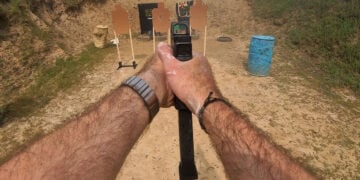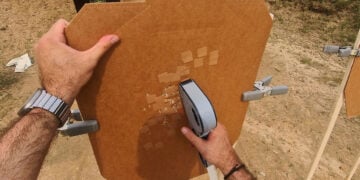The act of carrying a concealed pistol necessitates that the person takes on specific responsibilities he may otherwise not. One of those responsibilities is conduct. Our daily concealed carry practice demands good conduct. In order to maintain good conduct, I made a little list of 10 things that can adversely affect it.
You may not agree with all 10. You may have your own. Read through, check what applies, and make sure to put down what made your list in the comments below.
#1. Drinking
If I’m drinking, I’m not carrying. If I’m carrying concealed, I’m not drinking. It’s a trade-off, and it’s a risk. However, I can’t risk my impaired judgment assessing a situation as a lethal threat when it’s not. Heck, even if I correctly assess it, I can’t guarantee my reflexes will be the same as if I was sober.
And then there’s the legal side of it. What if I were forced to defend myself while intoxicated. Most states either make it illegal to possess a firearm under the influence or have a low limit set similar to DUIs. So you may have defended yourself but still get charged since you were intoxicated. Not a risk I’m willing to take.
#2. Drugs
While marijuana is widely accepted as a drug that the DEA should never have placed as a Schedule I drug, it still affects judgment, motor skills, and reaction times. And, while it’s in the process of being decriminalized on the state level in quite a few places, the federal government can still prosecute.
Did I also mention it’s still a question on the form we all fill out when we purchase a firearm?
If you are a person, who has a legitimate medical need to take marijuana, be mindful and don’t carry. Not only could you set yourself up for big trouble if the feds show up, but you’re also not doing yourself any favors if you need to fight.
#3. Prescription Drugs That Impair Judgement Or Motor Skills
It’s hard to say where the line exists for impaired judgment from prescription medications. There’s a whole range of drugs, and many of them have intended and unintended consequences. The general rule of thumb, I think, is if you can’t safely operate a car while under the influence, you shouldn’t carry a gun under the influence.
#4. Insomnia
Sleep is the mind’s best way to rejuvenate. A lot of good stuff happens when we hit consistent sleep schedules. When people get good sleep, most feel better, happier, are more alert, and calmer with social interactions. When that sleep cycle is interrupted or doesn’t exist, people tend to get more irritable. Arguments break out where there was no need before. If I can’t sleep, I know my judgment is affected. If my judgment is affected, I don’t know how well my motor skills, reflexes, and mindset will be affected. It’s a call you need to make for yourself but it’s something that I’ve found doesn’t mix well with carrying a concealed handgun.
#5. Severe Emotional Distress
In everyone’s life, a little rain must fall. If you find just too much is falling into yours, maybe it’s time to give yourself a rest. When bad things happen in life — or just stressful things — we don’t always have the luxury of stopping the world from spinning so we can process it. However, if you feel severely emotionally and physically impacted by external stressors (loss of a job, loss of a loved one, etc.), don’t be afraid to get counseling and figure out some ways to address those problems.
#6. Federal Property
Most federal property — like the post office and federal courthouses — don’t mix with concealed carry. It’s against the law for just about anyone to carry onto properly marked federal buildings.
#7. Amtrak
Amtrak trains even discriminate against off-duty police officers. There’s a firm no tolerance policy in place for concealed carriers. If you’re boarding an Amtrak train, be careful and know that it’s very legally risky to do so while carrying concealed.
#8. Commercial Airliners
Private jets? Sure. Check their policy. But before you board that Delta flight, please, please, please don’t carry or put a handgun in your carry-on bag. Checked luggage isn’t a problem so long as you follow the rules. There’s just no way — at present or in the foreseeable future — that concealed carriers will ever be able to board a commercial airplane with a handgun on their person.
For more information read the related articles below:
- Traveling Safely and Legally with Guns and Ammo on Airlines
- Why People Get Arrested at Airports with Firearms
- Have Gun Will Travel – Flying
#9. Jail (or Prison)
Jail and concealed carry never mix — unless you’re a bad guy, sadly. If you’re in jail, chances are pretty good that you can’t legally possess a gun when you get out. If you’re visiting someone in jail or prison, you definitely can’t carry a gun on you unless you’re an on-duty corrections officer that’s been expressly authorized to carry or a member of law enforcement who has authorization.
#10. Schools
Most states have laws explicitly forbidding anyone with a gun from entering onto K-8 school property. There can be exceptions. And, of course, there are concealed carriers who pick up their kids from school. However, do not walk into a school zone with a gun on you unless you are expressly authorized by the administration, law enforcement, or state codes from doing so.
For more information read the related articles below:
I’m sure I’ve missed a few things that will get pointed out in the comments. And that’s good. I hope I touched upon some topics that jogged your mind about what goes with your own concealed carry practice. You don’t need to agree with me on every single thing, but just remember that your responsibility to be a law-abiding citizen requires you to maintain good conduct and firm regard for your safety and those around you. Carry on!









